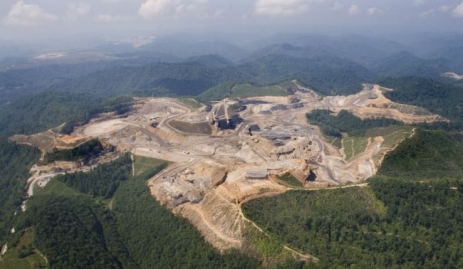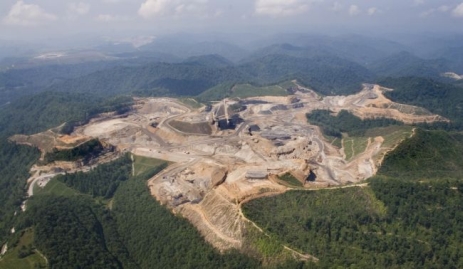
Offshore drilling, auto-efficiency standards, water-heater regs, green jobs for strippers … there’s a ton going on this week.
But today’s big news is a lot brighter than yesterday’s offshore drilling hubbub: the Obama administration announced sweeping new regulations for mountaintop removal, the coal-mining method that tends to (a) remove mountaintops, (b) fill mountain valleys with rubble, and (c) pollute waterways downstream.
The new EPA regs focus on clean water, which limits the ability of mining companies to dump waste freely, which puts the whole mountaintop-removal method in jeopardy. So it’s kind of a big deal. Both mining advocates and mountain-and-water defenders agree on this.
“It could mean the end of an era,” Luke Popovich of the National Mining Association told the Washington Post. He said that to limit valley fills “is tantamount to saying the intent is to strictly limit coal mining in Appalachia.”
“Mountaintop mining, by its nature, destroys water,” Joe Lovett of the Appalachian Center for the Economy and the Environment told the Post. “I hope it means the beginning of the end.”
And Kate Sheppard provides some good context:
The EPA has had a mixed record on MTR in the past year. Last fall they called for a time-out on MTR permits, but soon afterward approved a mine site in West Virginia, alarming many anti-MTR activists. Last week, however, the EPA vetoed the largest proposed MTR site in the country.
Enviromentalists cheered today’s move. But as Rainforest Action’s Amanda Starbuck points `out, the administration stopped short of issuing an outright ban on MTR, which many groups have called for. “Moving forward, we urge the EPA to take holistic measures to end this devastating practice once and for all,” says Starbuck. “We cannot end mountaintop removal coal mining pollution without ending mountaintop removal all together.”
A couple caveats: This is an executive-branch guidance, not a law, which means President Palin (shudder) could undo it in the future. Mountain defenders are calling for Congress to pass a Clean Water Protection Act and Appalachia Restoration Act to make protections more permanent. Also, the rule is exclusive to Appalachia and won’t affect other areas, like the Kensington gold mine in Alaska. There’s more from the intrepid West Virginia reporter Ken Ward, Jr., Jeff Biggers, and Jim Snyder.
Finally, MSNBC’s Howard Fineman has a post today that draws out some of the connections between coal, offshore oil and natural gas drilling, and renewable energy:
Forget whatever else you hear about energy policy, the real fight — and the real political problem — this year in Congress will be how to deal with our nagging reliance on the most abundant component of our carbon-based patrimony.
We can talk until we’re blue in the face about offshore drilling, wind power, natural gas, and energy conservation … but the short-term drift of history still dictates a heavy reliance on the dirtiest and deadliest of all fuels: coal.
For all the symbolic weight that offshore drilling carries, Fineman’s right that coal is America’s real energy dilemma. It’s cheaper than oil, dirtier than oil, and we have a lot of it. So the new protections are nothing to sniff at.


